| Srl | Item |
| 1 |
ID:
091123
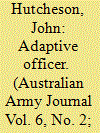

|
|
|
|
|
| Publication |
2009.
|
| Summary/Abstract |
The majority of officers will be working in a multi dimensional and unpredictable operational environment on complex problems that require an integrated inter-agency and/or coalition solution. To assist in developing those solutions officers will need to be more cooperative, compromising and collaborative in order to shape the desired outcome. This desire requires the ability to think critically, communicate effectively, and influence others through persuasive argument. This article seeks to highlight a how Army can develop officers who can think, communicate and influence other non Army people to implement the adaptive Army initiative.
|
|
|
|
|
|
|
|
|
|
|
|
|
|
|
|
| 2 |
ID:
091130
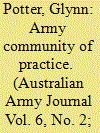

|
|
|
|
|
| Publication |
2009.
|
| Summary/Abstract |
In these times of economic frugality, the Army needs to consider all the avenues and opportunities available for the training and development of our soldiers and throw away some long held beliefs about how and by whom competence can be assessed and awarded. This article examines workplace learning and the contribution of Communities of Practice, Learning and Labour Networks to the gaining of knowledge, competence and expertise by our soldiers.
|
|
|
|
|
|
|
|
|
|
|
|
|
|
|
|
| 3 |
ID:
091128
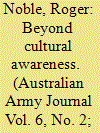

|
|
|
|
|
| Publication |
2009.
|
| Summary/Abstract |
This article contends that the experience of the early twenty-first century has highlighted a long-term systemic weakness in the formulation and execution of Western military strategy. The need for strategists to focus on people, culture and society is not just a counterinsurgency requirement; rather it should be an indispensible and enduring strand in all strategic calculations. There is a need to immigrate the thinking, methods, products and approach of anthropology into the formulation and execution of strategy. This is no easy task and the article identifies how this could be done through doctrine, education and practice.
|
|
|
|
|
|
|
|
|
|
|
|
|
|
|
|
| 4 |
ID:
091132


|
|
|
|
|
| Publication |
2009.
|
| Summary/Abstract |
This article provides an in-depth exploration and examination of operations against and around Post 11 as part of the Australian assault on Bardia. Despite the interesting nature of such operations in their own right, it aims at more than simply recounting details of this remarkable action. Events in and around Post 11 some 67 years ago provide a number of salutary lessons for modern commanders. In particular, the destructive effects of inflated ego and personal pride, stubbornness in the face of commonsense, command negligence and tactical incompetence are brought to the fore. These types of problems are as timeless as they are dangerous. Post 11 is what happens when they reign unchecked.
|
|
|
|
|
|
|
|
|
|
|
|
|
|
|
|
| 5 |
ID:
091133
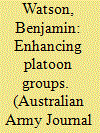

|
|
|
|
|
| Publication |
2009.
|
| Summary/Abstract |
This article identifies the unique ability a platoon group has to achieve success in the complex battlespace. The author takes his experiences as a platoon group commander in Afghanistan and shows that doctrine and combined arms theory have a place in the modern complex battlespace. The article explains that the fundamental infantry platoon cannot be effective in Afghanistan without key enablers from all corps. It further details the importance of fostering relationships between corps to improve combat power and battlefield effectiveness.
|
|
|
|
|
|
|
|
|
|
|
|
|
|
|
|
| 6 |
ID:
091124
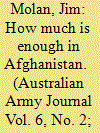

|
|
|
|
|
| Publication |
2009.
|
| Summary/Abstract |
The fight against the Taliban in Afghanistan has lasted for almost eight years now-longer than even the Second World War. The author argues that in this time, progress has been made, but that it has been made against a tide that now threatens to wash away the modest gains so bitterly made. Australian forces have been making gains in their sector, but with the Dutch contingent expected to leave sooner rather than later, the author insists that only a significantly increased Australian presence will help maintain the momentum towards success now slowly building. A surge now will give local Afghan forces the necessary breathing space within which they can be trained. If this training is conducted intelligently
and thoroughly, Afghan forces may reach a standard during this time such that Australian leaders could then seriously consider handing over responsibility for security. Ultimately, this could mean success, and a real chance to 'bring the diggers back home'.
|
|
|
|
|
|
|
|
|
|
|
|
|
|
|
|
| 7 |
ID:
091131
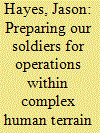

|
|
|
|
|
| Publication |
2009.
|
| Summary/Abstract |
This paper examines whether Army is preparing our soldiers with the skills to operate within a complex human environment. Recent operational experience has outlined that the key to success on operations is winning over the hearts and minds of the local population and denying support to the insurgents both physically and morally. Currently, our training is predominantly focused on providing the hard warfighting skills to be successful in a conventional war. There is no argument that this is important; however, our training also needs to provide soldiers with the key soft warfighting skills which are critical if we are going to be successful within a complex human environment.
|
|
|
|
|
|
|
|
|
|
|
|
|
|
|
|
| 8 |
ID:
091126
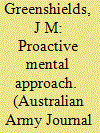

|
|
|
|
|
| Publication |
2009.
|
| Summary/Abstract |
In this article the author contends, from his own experience as a combat team commander, that commanders must first undertake significant self-preparation before preparing for command. This, coupled with a deep understanding of the combat team and the stressors that confront them, will enable commanders to exercise their command with maximum effectiveness.
|
|
|
|
|
|
|
|
|
|
|
|
|
|
|
|
| 9 |
ID:
091129
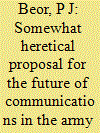

|
|
|
|
|
| Publication |
2009.
|
| Summary/Abstract |
Communications capability, equipment and training requirements have become increasingly complex over recent years, and this trend is only going to continue. As the subject matter experts, RASigs will have to look closely at communications at all levels, especially those which are traditionally performed by regimental signallers. This trend is even more pronounced in the Army Reserve, where the doctrinal role of the Formation Signals Squadron has been largely negated. Reserve Signals Squadrons have to adapt to this new paradigm if communications capability within the Army Reserve is to be maintained. This article examines three fundamentally different options to address this issue.
|
|
|
|
|
|
|
|
|
|
|
|
|
|
|
|
| 10 |
ID:
091127
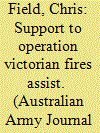

|
|
|
|
|
| Publication |
2009.
|
| Summary/Abstract |
The Victorian bush fires of February 2009 swiftly destroyed nearly two thousand homes and took over 170 lives. Yet, equally as swift, and in spite of the extensive damage, the ADF responded quickly and efficiently to this disaster with Operation VICTORIAN FIRES ASSIST. While the success of this operation was obvious for all to see, the author identifies several lessons that can be drawn from this unique experience, examining what worked as well as what did not-and how matters could be improved. To this end, the author offers a number of practical and innovative suggestions for how the ADF can better utilise its mix of contractor and military provided base services to better support ongoing warfighting tasks while mounting an equally effective response to similar contingencies in future.
|
|
|
|
|
|
|
|
|
|
|
|
|
|
|
|
| 11 |
ID:
091125
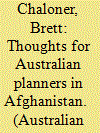

|
|
|
|
|
| Publication |
2009.
|
| Summary/Abstract |
Afghanistan is an increasingly complex environment set to test our traditional approaches to planning and problem solving. With an evolving commitment, an ambitious force development plan up to 2030 and ompeting demands, there is a need for planners from all services to consider more innovative and adaptive approaches to mission planning. This article offers a few thoughts based on the author's experience in Afghanistan to aid in stimulating new approaches to both this and future operational thinking and planning.
|
|
|
|
|
|
|
|
|
|
|
|
|
|
|
|